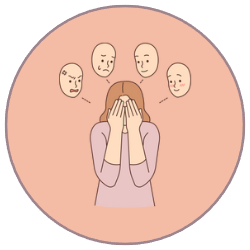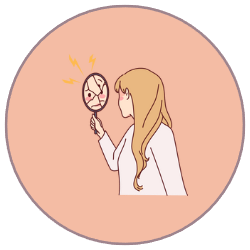Dialectical Behavior Therapy San Diego
Do you feel like you are being pulled in a thousand different directions?
DBT Can help!

Welcome to Inward Healing Therapy, a leading center in San Diego, California dedicated to helping individuals lead fulfilling lives. Our approach is rooted in the transformative power of dialectical behavior therapy (DBT), a therapy designed to empower you with practical skills for the present moment. Through our specialized programs, we strive to provide comprehensive education, enabling you to cultivate healthy coping mechanisms, effectively manage your emotions, and build resilient interpersonal connections. Our team of experienced San Diego therapists is committed to guiding you on your journey toward personal growth and well-being. Take the first step towards a brighter future with Inward Healing Therapy.

How Can DBT Help?
Dialectical Behavior Therapy (DBT) is a versatile therapeutic approach that has shown efficacy in treating various mental health conditions. Research trials have consistently demonstrated its effectiveness in helping individuals with bulimia, depression, binge eating disorder, bipolar disorder, substance abuse, and post-traumatic stress disorder (PTSD).
DBT combines elements of cognitive-behavioral therapy with mindfulness practices and acceptance-based strategies to provide a comprehensive treatment framework. Its focus on developing coping skills, emotion regulation, and interpersonal effectiveness makes DBT a valuable option for individuals seeking support and healing in these areas.

How DBT Works
Dialectics, an essential concept in Dialectical Behavior Therapy (DBT), encompasses the process of reconciling opposing ideas to achieve equilibrium. In our interactive DBT online sessions, we will collaboratively explore and cultivate effective strategies for embracing the coexistence of seemingly contradictory notions. This approach aims to counter rigid, all-or-nothing thinking patterns and instead encourages the development of a both/and mindset, which acknowledges and integrates diverse perspectives.
At the core of DBT lie the principles of acceptance and transformation, empowering individuals to navigate life's challenges with resilience and growth. By integrating these principles into our sessions, we will work together to foster a balanced and dynamic mindset that enhances personal well-being.
The Four Focus Areas Of DBT

Mindfulness
Mindfulness focuses on enhancing a person’s capacity to accept and be present in the current moment.

Distress Tolerance
Rather than attempting to escape from bad feelings, distress tolerance increases a person’s tolerance of them.

Emotion Regulation
Emotion regulation provides tactics for dealing with and changing the powerful emotions that produce issues in a person’s life.

Interpersonal Effectiveness
Interpersonal effectiveness provides skills that enable a person to communicate with others in a confident, self-respecting, and relationship-building manner.

What To Expect From DBT
DBT treatment typically incorporates two essential components: individual therapy sessions and DBT skills groups. Individual therapy sessions provide a personalized and focused therapeutic experience, with the patient engaging in one-on-one interaction with a skilled therapist. These sessions serve to fulfill the specific therapeutic needs of the individual, ensuring their progress and well-being throughout the treatment journey. The therapist not only guides the patient in acquiring and utilizing DBT skills in their daily life but also plays a vital role in maintaining their motivation and addressing any challenges or obstacles that may arise during the course of therapy. This collaborative approach empowers individuals to navigate their unique circumstances and effectively apply the principles of DBT in achieving lasting change and emotional resilience.
DBT skills groups are designed to help participants learn and practice valuable skills in the company of others. These groups are led by qualified therapists who facilitate the learning process, teaching skills, and guided group activities. After each session, group members are assigned homework, such as mindfulness exercises, to further reinforce the skills they have learned. While DBT can be delivered in various formats by therapists, some individuals may choose to solely engage in one-on-one treatment sessions, foregoing the weekly skills group. Conversely, others may find the group setting more beneficial and prefer it over individual sessions.
At present, Inward Healing Therapy does not offer DBT groups; however, if you are interested in participating in a group, we can assist you in connecting with a reputable DBT group facilitated by another provider. Joining a DBT group can offer additional support and the opportunity to learn from others facing similar challenges, enhancing your therapeutic experience.
Acceptance & Change:
Through DBT therapy, you’ll discover techniques for accepting and tolerating your life circumstances, emotions, and self. You will also learn techniques that will allow you to make positive changes in your conduct and interactions with others.
Behavioral
You’ll learn how to examine issues or damaging behavior patterns and replace them with healthier and more productive ones.
Cognitive
You’ll concentrate on modifying ideas and beliefs that are no longer productive or beneficial.
Support
You will be encouraged to identify and enhance your positive strengths and traits.

The Advantages
To make positive changes we’ll work together to reconcile the seeming contradiction between self-acceptance and change. This process entails providing validation, which makes individuals more inclined to collaborate and less likely to be distressed by the prospect of change. In practice, the therapist affirms that a person’s behaviors make sense in the context of their own experiences without necessarily agreeing that the activities are the best way to solve an issue.
Get Started Today
Many people in San Diego and throughout California battle with continuing emotional instability, moodiness, and chronic dissatisfaction. Is this your situation? Contact Inward Healing Therapy when you’re ready to take control of your emotions. Emotions may both heal and damage — and in our online dialectical behavioral therapy, we will demonstrate the distinction.
If you have any further questions, feel free to check out my FAQ page for more information.
Helpful Insights
Understanding Protest Behavior Anxious Attachment: Reclaim Your Relationships
Have you ever felt the need for frequent reassurance in a relationship? Perhaps you are excessively concerned about your partner's distance, which leads to conflicts and emotional ups and downs. This might indicate a worried connection.
Attachment styles, which develop in early life,...
moreUnderstanding and Overcoming Rigid Boundaries
Consider an invisible force field surrounding you—a personal space that limits how close you allow people to get. This space, both physical and emotional, indicates your limitations. Healthy boundaries are vital for building solid, secure partnerships. They help you feel respected and valued...
moreThe Narcissist Checklist: Is Someone in Your Life Playing You?
Have you ever had the impression that you should be wary of people all the time? Maybe you feel invisible and unheard when a friend just talks about themselves and their achievements. On the other hand, it may be a partner who consistently downplays your feelings, making you feel like you're to...
more7 Steps to Getting Through a Breakup Without Losing Your Sanity
Breakups are never easy to go through, no matter what stage you’re in. Whether you and your partner broke up three days ago or three years ago, it can take some time before you feel normal again. You may feel depressed, anxious, or even completely lost as to where your life is going from here....
more



